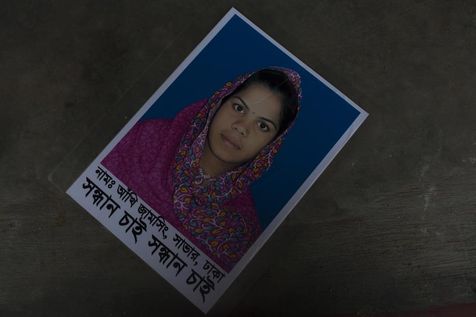Professor Rehman Sobhan’s comments have been featured in a report in the French Newspaper Libération that denounced the lack of support for the survivors of Rana Plaza Tragedy that took lives of 1,132 RMG workers in April this year.
[Below is a translated version of the story]After the disaster of Dhaka, the case continues working
Published on August 11, 2013 at 19:56
By MICHEL HENRY
According to an independent think tank Bangladesh, Rana Plaza 750 employees have not received compensation, more than one hundred days after the collapse of the building in the suburbs of Dhaka that was 1131 dead on April 24.

“They have no work, no money. They are in a miserable situation, “denounces Kalpona Akhter, an activist. Worse, the union bosses textiles, BGMEA (1) is unable to identify the employees present on the day of the tragedy. She talks about 2760 people. In fact, it would rather be 3900. By publishing this information in a report of 3 August, the Centre for Policy Dialogue (CPD) has criticised the “lack of strategy” of the government.
The situation is serious: some of the wounded cannot pay their medical treatment, families are destitute because they have not found a job. Employers have not paid the full wages or overtime (for 60 hours per week, paid 30-80 euros per month), or redundancy or death insurance (1 000 euros per death ). And all the workers did not have insurance …
Vicious circle. The union confederation figure needs a compensation of € 54 million, far more than the Bangladeshi RMG sector is willing to pay. Unions and NGOs try to involve Western brands sourcing from Bangladesh. But few of them have been accepted. A meeting is scheduled for September in Geneva to encourage them to participate.
In July, Western companies have spent two separate agreements (80 European side, most Japanese Uniqlo since Thursday, and 17 in North America on the other) to improve security in Bangladeshi factories that provide and finance renovations. But the US agreement is not binding.
And how to identify plants that sprout without any control? How to supervise with only 51 inspectors for 6,000 companies (additional 200 must be hired by the end of the year)? How to ensure that the work is done? Another problem is that after every accident, the country announced measures that do not come into force for lack of controls. How to break the vicious circle? CPD calls “a concrete plan, responsibilities established a precise timetable,” and transparency, code of conduct and independent monitoring bodies.
But nothing like that exists in this country plagued by corruption. Same concern for the status of trade unions. Of 5000, only a few dozens of textile factories have trade unions. The law has changed slightly in mid-July. So far, the boss was warned when an employee syndiquait: harassment was beginning, termination. This clause has been deleted, but according to the militant Kalpona Akhter, “it does not mean that workers will join unions. Once they begin to organise, employers are stopping. Protection should be delegated.
“ The problem is deeper, deplores the Chairman of CPD, Rehman Sobhan: “For us to be competitive, it is necessary that employees have no right, we can dismiss them without a problem. This is the flexibility that allows us to be competitive. “ Rana Plaza tragically illustrated the consequences of a lack of unions. “On the morning of the tragedy, said Sobhan, pressure was put on workers who refused to enter [the building had cracks, note] : “If you do not go, you lose your job.” “What choice do I have? said employees. If I do not go, who will feed my children, who will pay for their education?” If these workers were part of a union, no employer could force them to risk their lives.”
“Sermons”. Kalpona Akhter nevertheless notes that “we now see some employees refuse to enter their factory as security is not improved.” A little progress …
But Sobhan says, perpetual tragedy of Bangladesh lies in the “unequal relationship” between employers and workers: “This is a systemic problem. There is no governance in this country capable of controlling the situation. The only control is the market. “ , and the issue is not confined to Bangladesh, Sobhan added. “We will have sermons from our partners:” You must do this and that. “ But as the competition will continue, Wal-Mart and others will always seek the cheapest suppliers for western customers especially look at the price. “
The T-shirt bought $ 5 in Bangladesh “will always be sold at 25 in New York.” It is therefore, according to him, “they require brands accountable for the riches that create our productions.” It does not work.
(1) Bangladesh Garment Manufacturers and Exporters Association.



